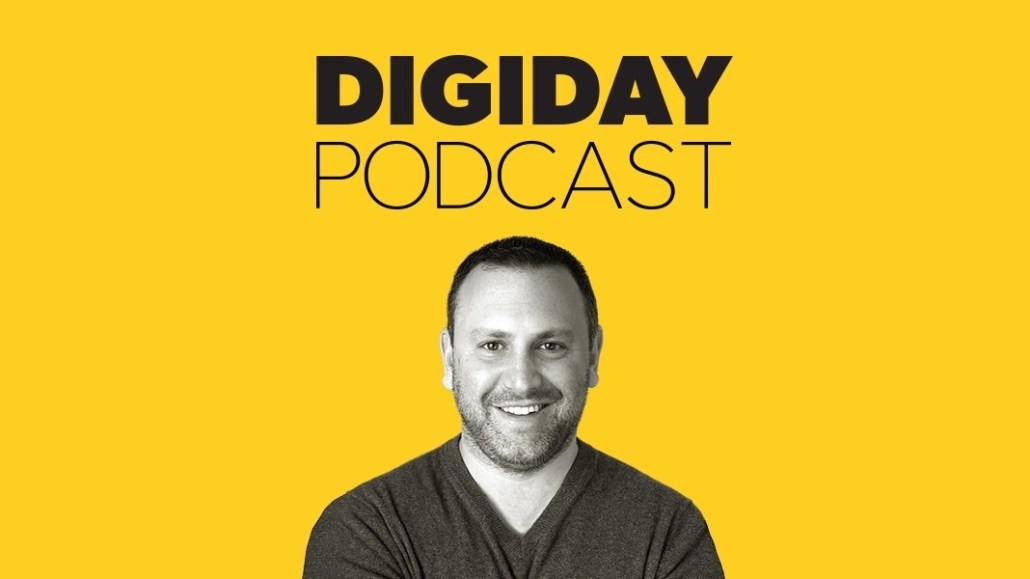Secure your place at the Digiday Media Buying Summit in Nashville, March 2-4
‘Proactive is the path’: Group Nine’s Geoff Schiller on his selling strategy

Last year proved to be one of the most challenging years on record for the media industry with ad revenue drying up in the second quarter, but for Group Nine, it was magnified by its entry into its first full year following the merger with PopSugar.
In the first few weeks of the merger, the company’s chief revenue officer Geoff Schiller came onto the Digiday Podcast to talk about the vertical sales strategy he implemented at the beginning of 2020 that required sellers to have a deep endemic focus — a strategy carried over from his time leading sales at PopSugar.
This would allow sales expertise that normally fits with a brand like PopSugar — like entertainment — transfer to a brand like Thrillist, after main sponsors in the travel and restaurant industry took a big hit and pulled back from advertising in 2020.
Navigating last year helped Schiller realize the horizontal focuses all of Group Nine’s titles needed to account for as advertisers’ needs shifted throughout the year. They faced similar opportunities to heighten first-party insights, in light of the third-party cookie phase out, and with brands looking to invest more in multicultural messaging and corporate social responsibility.
Pivoting to include the horizontal with the vertical, Group Nine’s revenue in 2020 was flat with 2019, according to Schiller, but the fourth quarter ended up being the best on record for the company.
In the latest episode of the Digiday Podcast, Schiller talks about how his team adapted its sales strategy in 2020.
Highlights from the conversation below have been edited for clarity.
When one endemic category suffers, another one can help right the ship
Anytime you’re backed into a corner, you tend to have fast twitch, muscle fiber thinking — you’re able to find new pathways really fast. Some organizations are able to do that. Others just sort of flail.
Our strategy is certainly to leverage the power of the portfolio. And if we were one brand, we would definitely be stuck. But because we’re five, we have that power of the portfolio opportunity to then say, ‘how do we have a relationship [with an advertiser for one title] that can be leveraged over [at another title]? How do we open the aperture from one category to the next?’ The consumer packaged goods growth on The Dodo is definitely emblematic of that.
Controlling the RFP process
I don’t think that the RFP in its current form is going anywhere, as much as we all would, myself included, like for it to be more efficient. I don’t think that it will be efficient until clients can take more onus for their role. [But] I think the answer is in the short term to sort of take matters into your own hands and and try to control the outcome as best you can.
We’re looking at close analysis by account. So if we see we’ve lost three RFPs in a row, red flag. If we lost five, we do a sync with a variety of stakeholders and we say number one, are we really a fit for this brand? Or number two, do we have something that they want? And if so great, why are we still losing? If we don’t have what they want, then let’s go back to them and just say diplomatically, ‘We really appreciate you considering us, we’re not a fit.’ We’re trying to sort of take destiny into our own hands with the RFP process by making it as actionable as possible.
Building upfronts to be a core part of the sales strategy
The upfront philosophy is governed by wanting to create lifetime value relationships with clients. We want to deliver white glove service. And we want to be able to leverage the full funnel capabilities that Group Nine has in order to really drive business outcomes for our clients. And so the best articulation of that is an upfront.
Year over year, we’re seeing 20% growth already in terms of those upfront deals that we struck for the following year. And those upfronts also represent double digits of our total annual revenue.
More in Media

Media Briefing: Turning scraped content into paid assets — Amazon and Microsoft build AI marketplaces
Amazon plans an AI content marketplace to join Microsoft’s efforts and pay publishers — but it relies on AI com stop scraping for free.

Overheard at the Digiday AI Marketing Strategies event
Marketers, brands, and tech companies chat in-person at Digiday’s AI Marketing Strategies event about internal friction, how best to use AI tools, and more.

Digiday+ Research: Dow Jones, Business Insider and other publishers on AI-driven search
This report explores how publishers are navigating search as AI reshapes how people access information and how publishers monetize content.








